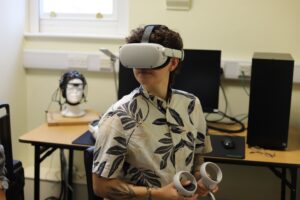“Human attention has natural limits” – Scientist calls for paradigm shift when it comes to maintaining vigilance

A critical commentary from the University of Chichester argues that the human brain simply cannot maintain uninterrupted vigilance, regardless of training or motivation – a finding with profound implications for high-risk professions.
Dr. Benjamin Sharpe, Senior Lecturer in Cognitive Psychology, has synthesized decades of research across psychology, neuroscience, and cognitive science to demonstrate that “perfect vigilance” is not merely difficult but fundamentally impossible. His work, published in the journal Cognitive Science, challenges traditional approaches to attention-demanding roles in aviation, healthcare, industrial safety, and security.
“Our brains are not designed for continuous, unwavering attention,” explains Dr. Sharpe. “This isn’t a matter of willpower or training – it’s about basic human biology and neural architecture.”
Drawing on his extensive research with lifeguards – professionals tasked with maintaining vigilance in high-stakes environments – Dr. Sharpe documented consistent patterns of attention decline. His studies revealed that detection performance deteriorates significantly after just 10-30 minutes of monitoring, regardless of experience level.
While experienced lifeguards outperformed novices and those with higher working memory capacity showed advantages in demanding conditions, the fundamental limitation remained: no human can maintain optimal attention indefinitely.
“What’s particularly concerning is how we respond to attention failures,” Dr. Sharpe notes. “When vigilance breaks down – as it inevitably will – we often blame individuals for negligence or carelessness, sometimes with serious legal consequences. But we’re essentially blaming people for having human brains.
“Sustained attention isn’t just difficult—it’s fundamentally constrained by our biology, neural architecture, and cognitive limitations. From cellular adaptation to oscillatory brain rhythms, the evidence is clear: we are not built for unbroken vigilance.”
His paper, “The Sustained Attention Paradox: A Critical Commentary on the Theoretical Impossibility of Perfect Vigilance,” represents the culmination of years studying attention across diverse populations including military personnel, students, and esports competitors.
Rather than pursuing the impossible goal of unbroken attention through more rigorous training, Dr. Sharpe advocates for a paradigm shift in how we design human-technology systems.
“The solution isn’t training harder or focusing more intensely,” he emphasizes. “We need adaptive automation, thoughtful task redesign, and a fundamental cultural shift in how we conceptualize attention failures—not as personal shortcomings but as predictable outcomes of system design.”
This research has significant implications for industries where vigilance failures can have catastrophic consequences, suggesting that safety protocols should work with, rather than against, the brain’s inherent limitations.
Access the full study in Cognitive Science: “The Sustained Attention Paradox: A Critical Commentary on the Theoretical Impossibility of Perfect Vigilance”
Explore Dr. Sharpe’s research on his laboratory page: Human Attention Laboratory. Join the conversation by following Dr. Sharpe on Twitter/X @benjamintsharpe for the latest updates.




